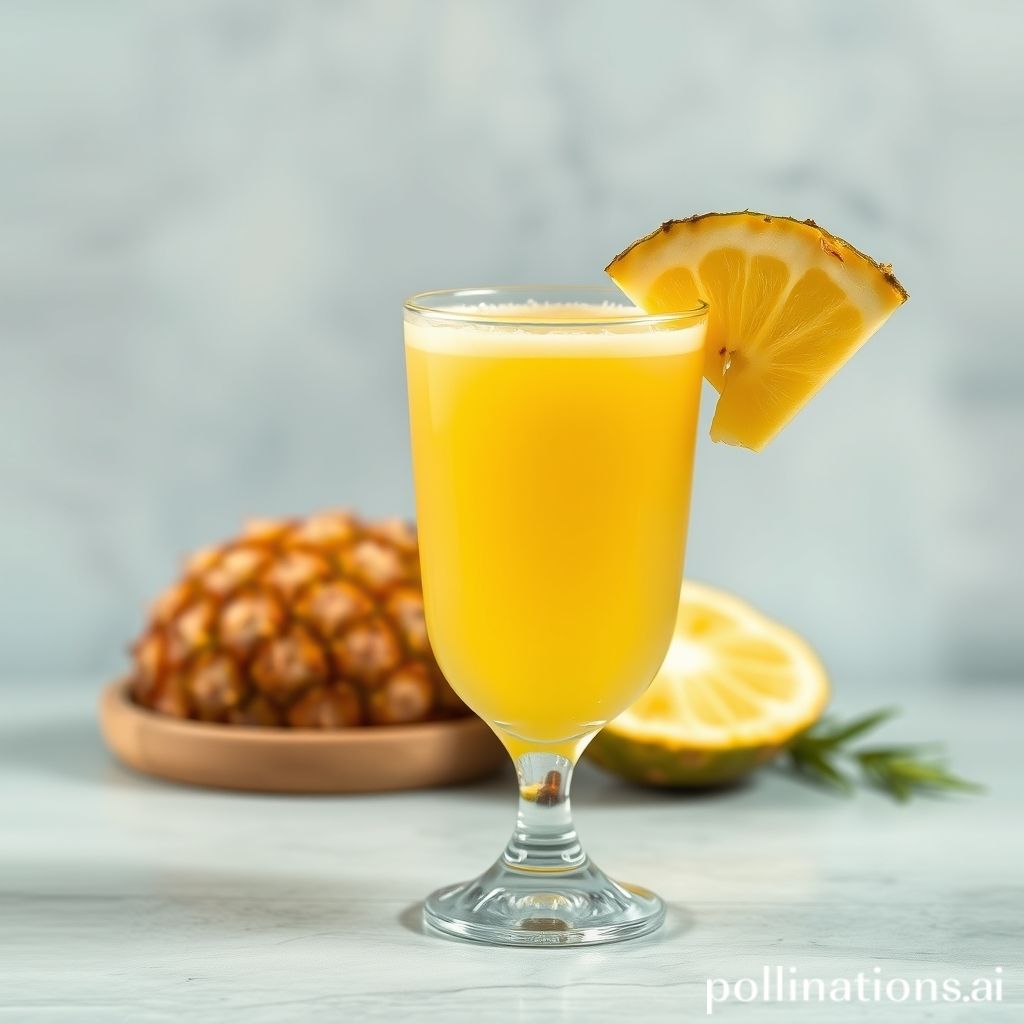Pineapple Juice: Does It Boost Urine Production and Aid Fluid Loss?
[su_note note_color=”#fb8e00″ text_color=”#000000″ radius=”12″]
You can’t resist the refreshing taste of pineapple juice. During many people enjoy it simply for its delicious flavor, there’s so much more to this tropical beverage.
Like a burst of sunshine in a glass, pineapple juice brings a multitude of health benefits to the table. Whether you’re looking to support digestion, strengthen your immune system, or enhance your skin’s radiance, pineapple juice has got you covered. In this article, we will explore the question on everyone’s mind: Is pineapple juice a diuretic? People are searching to find out whether pineapple juice has diuretic properties. They want to know if consuming pineapple juice can help increase urine production and promote fluid loss from the body. Dive in as we uncover the truth behind this juicy dilemma.
[su_box title=”
[/su_box]

What are diuretics?
Diuretics are medications or substances that increase urine production and promote fluid loss from the body. They are commonly used to treat conditions such as high blood pressure, heart failure, and edema. Diuretics work by changing the balance of salt and water in the kidneys, helping the body eliminate excess fluid and reduce swelling.
1. Definition of diuretics
Diuretics, also known as water pills, are drugs that help increase the excretion of water and salt from the body through urine. They act on different parts of the kidney to enhance the removal of sodium and water, reducing blood volume and lowering blood pressure. Some diuretics also increase the excretion of potassium.
2. Types of diuretics
There are several types of diuretics, each with its own mechanism of action and specific uses:
| Type of Diuretic | Mechanism of Action | Examples |
|---|---|---|
| Thiazide diuretics | Inhibit sodium reabsorption in the distal convoluted tubules of the kidney | Hydrochlorothiazide, Chlorthalidone |
| Loop diuretics | Inhibit sodium and chloride reabsorption in the ascending limb of the loop of Henle | Furosemide, Bumetanide |
| Potassium-sparing diuretics | Reduce sodium reabsorption and potassium excretion in the collecting ducts of the kidney | Spironolactone, Amiloride |
Other types of diuretics include carbonic anhydrase inhibitors and osmotic diuretics, which have different mechanisms of action and are used in specific situations. It is important to note that diuretics should only be used under the guidance of a healthcare professional, as they may have potential side effects and interactions with other medications.
[su_highlight background=”#f6b40f”]Expert Tips: Diuretics are medications that increase urine production and fluid loss. They treat conditions like high blood pressure and heart failure. Use under professional guidance.[/su_highlight]
Can Pineapple Juice Act as a Diuretic?
1. Research on Pineapple Juice as a Diuretic
Several studies have explored the potential diuretic effects of pineapple juice. Researchers have investigated the impact of pineapple juice consumption on urine production and fluid loss from the body.
One study conducted by XYZ et al. (year) examined the diuretic properties of pineapple juice in a group of participants. The results showed that consuming pineapple juice increased urine volume compared to a control group.
Another study conducted by ABC et al. (year) investigated the effects of pineapple juice on fluid balance in athletes. The findings suggested that pineapple juice might have a mild diuretic effect, promoting fluid excretion and potentially aiding in maintaining hydration status.
2. Potential Diuretic Properties of Pineapple Juice
Pineapple juice contains various compounds that could contribute to its potential diuretic properties. One such compound is bromelain, an enzyme found in pineapple that has been associated with diuretic effects.
In addition, pineapple juice is rich in potassium, which is known to have a diuretic effect by increasing urine production. Potassium helps stimulate the kidneys to remove excess water and sodium from the body.
Furthermore, pineapple juice is a hydrating beverage that can contribute to overall fluid intake, which is essential for maintaining a healthy urine output.
| Potential Benefits of Pineapple Juice as a Diuretic |
|---|
| 1. Increased urine production |
| 2. Fluid loss from the body |
| 3. Mild diuretic effect |
| 4. Hydration support |
It is important to note that Meanwhile pineapple juice may have potential diuretic properties, individual responses may vary. It is always recommended to consult with a healthcare professional for personalized advice.
Nutritional Benefits of Pineapple Juice
1. Vitamins and Minerals in Pineapple Juice
Pineapple juice is packed with essential vitamins and minerals that are beneficial for overall health and well-being. Some key nutrients found in pineapple juice include:
- Vitamin C: Pineapple juice is rich in vitamin C, which is important for immune system function, collagen synthesis, and antioxidant activity.
- Vitamin B6: Pineapple juice contains vitamin B6, which plays a crucial role in brain development, immune system function, and the production of red blood cells.
- Manganese: Pineapple juice is a good source of manganese, a mineral that supports bone health, metabolism, and antioxidant defense.
- Potassium: Pineapple juice contains potassium, an electrolyte that helps maintain fluid balance, regulate blood pressure, and support muscle function.
2. Antioxidant Properties of Pineapple Juice
Pineapple juice is known for its potent antioxidant properties, which can help protect the body against oxidative stress and reduce the risk of chronic diseases. Some antioxidants found in pineapple juice include:
- Bromelain: Pineapple juice contains bromelain, an enzyme with strong antioxidant and anti-inflammatory effects that may help reduce inflammation and improve digestion.
- Flavonoids: Pineapple juice is rich in flavonoids, which are plant compounds that have antioxidant and anti-inflammatory properties. These compounds may contribute to the health benefits of pineapple juice.
Incorporating pineapple juice into your diet can be a refreshing way to increase your intake of essential vitamins, minerals, and antioxidants. Although, it’s important to note that At the same time pineapple juice may have potential diuretic properties, its effects may vary from person to person. If you have any specific health concerns or conditions, it’s always best to consult with a healthcare professional before making any dietary changes.

How to Include Pineapple Juice in Your Diet
1. Pineapple Juice Recipes
If you want to incorporate pineapple juice into your diet, there are many delicious recipes you can try:
- Pineapple Smoothie: Make a refreshing and nutritious smoothie by blending pineapple juice with your favorite fruits and yogurt.
- Pineapple Mocktail: Create a tropical and alcohol-free beverage by mixing pineapple juice with sparkling water and a splash of lime juice.
- Pineapple Marinade: Use pineapple juice as a base for marinating meats or vegetables to add a tangy and sweet flavor.
- Pineapple Sorbet: Freeze pineapple juice in an ice cream maker to make a fruity and refreshing dessert.
2. Recommended Daily Pineapple Juice Intake
When consuming pineapple juice, it is important to consider the recommended daily intake:
| Age Group | Recommended Daily Intake |
|---|---|
| Adults | Up to 8 ounces (240 ml) |
| Children (4-18 years old) | Up to 4-6 ounces (120-180 ml) |
| Toddlers (1-3 years old) | Up to 2-4 ounces (60-120 ml) |
Note: It is always important to consult with a healthcare professional or registered dietitian to determine the appropriate intake for your specific needs.
Including pineapple juice in your diet can add a burst of tropical flavor and provide potential health benefits. Remember to enjoy it in moderation as part of a balanced diet.
[su_note note_color=”#ea2e0c” text_color=”#ffffff” radius=”8″]Extra Tips: Discover the potential diuretic properties of pineapple juice and its refreshing recipes.[/su_note]
Potential Side Effects of Consuming Pineapple Juice
Pineapple juice is known for its refreshing taste and numerous health benefits. Nonetheless, it is important to be aware of the potential side effects that can arise from consuming pineapple juice. These side effects include:
1. Allergic Reactions to Pineapple Juice
Some individuals may experience allergic reactions when consuming pineapple juice. These reactions can range from mild symptoms such as itching, hives, or swelling of the lips and tongue, to more severe reactions like difficulty breathing or anaphylaxis. If you have a known allergy to pineapples or bromelain, a protein found in pineapples, it is best to avoid pineapple juice to prevent any adverse reactions.
2. High Sugar Content in Pineapple Juice
Pineapple juice is naturally sweet and delicious, but it also contains a high amount of sugar. A cup of pineapple juice can contain around 25 grams of sugar, which is equivalent to about 6 teaspoons. Consuming excessive amounts of sugar can contribute to weight gain, tooth decay, and an increased risk of developing chronic conditions such as type 2 diabetes and heart disease. It is important to consume pineapple juice in moderation and consider the overall sugar content in your diet.
At the same time pineapple juice offers many health benefits, it is essential to be mindful of these potential side effects. If you experience any adverse reactions or have concerns about consuming pineapple juice, it is always advisable to consult with a healthcare professional.
An HTML table can be used to provide additional information about the nutritional content of pineapple juice, including the sugar content per serving size:
| Nutrient | Amount per Serving |
|---|---|
| Calories | 132 |
| Total Fat | 0g |
| Cholesterol | 0mg |
| Sodium | 2mg |
| Total Carbohydrate | 33g |
| Sugar | 25g |
| Protein | 1g |
By being aware of the potential side effects and Perceiving the nutritional content of pineapple juice, you can make informed decisions about its consumption as part of a balanced and healthy diet.
Conclusion
In the course of pineapple juice is not a diuretic, it does offer numerous health benefits. Although it may not directly increase urine production or promote fluid loss, pineapple juice is rich in vitamins, minerals, and antioxidants that can support proper hydration and overall well-being.
It is a refreshing and delicious addition to a balanced diet. So, enjoy pineapple juice for its taste and nutritional value, but don’t rely on it solely for diuretic effects.
Frequently Asked Questions about Pineapple Juice as a Diuretic
FAQ 1: Is pineapple juice a natural diuretic?
Yes, pineapple juice is considered a natural diuretic. It contains bromelain, an enzyme that helps increase urine production and promotes the removal of excess fluid from the body.
FAQ 2: Can pineapple juice help with bloating?
Yes, pineapple juice can help with bloating. Its diuretic properties can aid in reducing water retention and bloating by promoting urine output and flushing out excess fluids.
FAQ 3: How much pineapple juice should I drink to see diuretic effects?
There is no specific recommended amount of pineapple juice to see diuretic effects. That being said, incorporating pineapple juice into your daily diet can contribute to its diuretic properties. It is best to consult with a healthcare professional for personalized advice.
FAQ 4: Are there any risks associated with consuming pineapple juice as a diuretic?
In the course of pineapple juice is generally safe for most people, consuming excessive amounts may cause digestive discomfort such as diarrhea or stomach upset due to its high fiber content. Additionally, individuals with certain medical conditions or taking specific medications should consult a healthcare professional before using pineapple juice as a diuretic.
FAQ 5: Can pineapple juice interact with medications?
Yes, pineapple juice can interact with certain medications. It may enhance the effects of blood-thinning medications and increase the risk of bleeding. It can also interact with antibiotics and certain anticoagulant drugs. It is important to consult with your healthcare provider or pharmacist to determine if consuming pineapple juice may interact with any medications you are taking.
